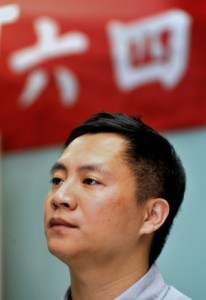By nealmoore | Posted May 27, 2014 | Taipei, Taiwan
CNN PRODUCER NOTE neal moore told me, ‘I’ve covered the Chinese dissident beat here in Taipei for the past several years. I reached out to Wang Dan to share his thoughts on the past, present, and future of the protests, and was surprised when he got directly back with three powerful responses. I think there’s a lot to be learned from these students’ sacrifice.’
– hhanks, CNN iReport producer
Tiananmen’s Wang Dan to Beijing: Democracy, or die
By Neal Moore (CNN iReport)
Twenty-five years ago, in early June 1989, as the People’s Liberation Army’s tanks began to roll and automatic weapons fire rang out, the international media, gathered in Beijing to cover a visit by Soviet leader Mikhail Gorbachev for a rare Sino-Soviet summit, found themselves in the midst of a different story.
The crackdown on civilian and student protestors at Tiananmen Square, also known as the June 4 Massacre, would leave hundreds, if not thousands dead. The government’s response against unarmed activists was beyond brutal, and it played out on television screens and newspaper front pages worldwide.
Twenty-five years later, on June 4, 2014, the world will pause to remember.
Wang Dan was the most visible leader of the Tiananmen Square protest. You might remember him. He was the one with the big glasses, slight build, and the bullhorn. After the massacre, Wang was No. 1 on the Chinese government’s “most wanted” student list. He was captured, and served four years in jail before going into exile – first in America, where he earned a Ph.D. in history from Harvard University, and then to Taiwan, where he has taught cross-strait history at National Chengchi University and National Tsing Hua University.
I caught up with Wang Dan via an email interview, and asked, in light of the 25thanniversary, if he could remind people of the message he was trying to deliver to the Chinese Communist Party at Tiananmen Square.
“We had two appeals,” Wang told me. “No. 1: Dialogue directly with the government, and No. 2: To modify the April 26 editorial of the People’s Daily.”
The April 26 editorial, titled “The Necessity for a Clear Stand Against Turmoil,” was broadcast on national radio and television in China, and appeared on the front page of the People’s Daily, a Beijing-based mouthpiece of the Communist Party. The editorial, penned by deputy chief of propaganda Zeng Jianhui on behalf of paramount leader Deng Xiaoping, deemed the protestors part of “a well-planned plot … to confuse the people and throw the country into turmoil.” The piece effectively changed the party’s attitude toward the protestors, based on misinformation. The students had not called on the government to step down, as alleged in Jianhui’s editorial, but for a dialogue of reform and openness first initiated by Deng in 1978.
Tiananmen Square remains a pivotal, game-changing event in the history of modern-day China. Although the students lost their bid for freedom, their argument for a voice carried weight with the rest of the world, and shaped how the world would view China, as well as themselves, in the foreseeable future.
In retrospect, 25 years later, I asked Wang what lessons he believes China, and the world, have taken away from the Tiananmen Square protest?
“The world needs to believe that from 1989, even Chinese people look forward to democratization,” he explained. “Anytime they think they have a chance, like in 1989, they will not hesitate to stand up.”
And so the world watches and waits. Will China enter into a dialogue of openness suggested by Deng Xiaoping in 1978? Will it carry out “political restructuring” as promised by Wen Jiabao at the United Nations General Assembly in 2010? Or will it stay the course and straddle what some observers refer to as a Leninism-plus-Consumerism strategy?
According to Wang Dan, the choice is simple. My final question was what he would like to say to the leadership in Beijing today.
“Think about the party’s future,” Wang replied. “There will be only two choices: Democracy, or die.”
Photo courtesy Wang Dan
From http://ireport.cnn.com/docs/DOC-1137539

